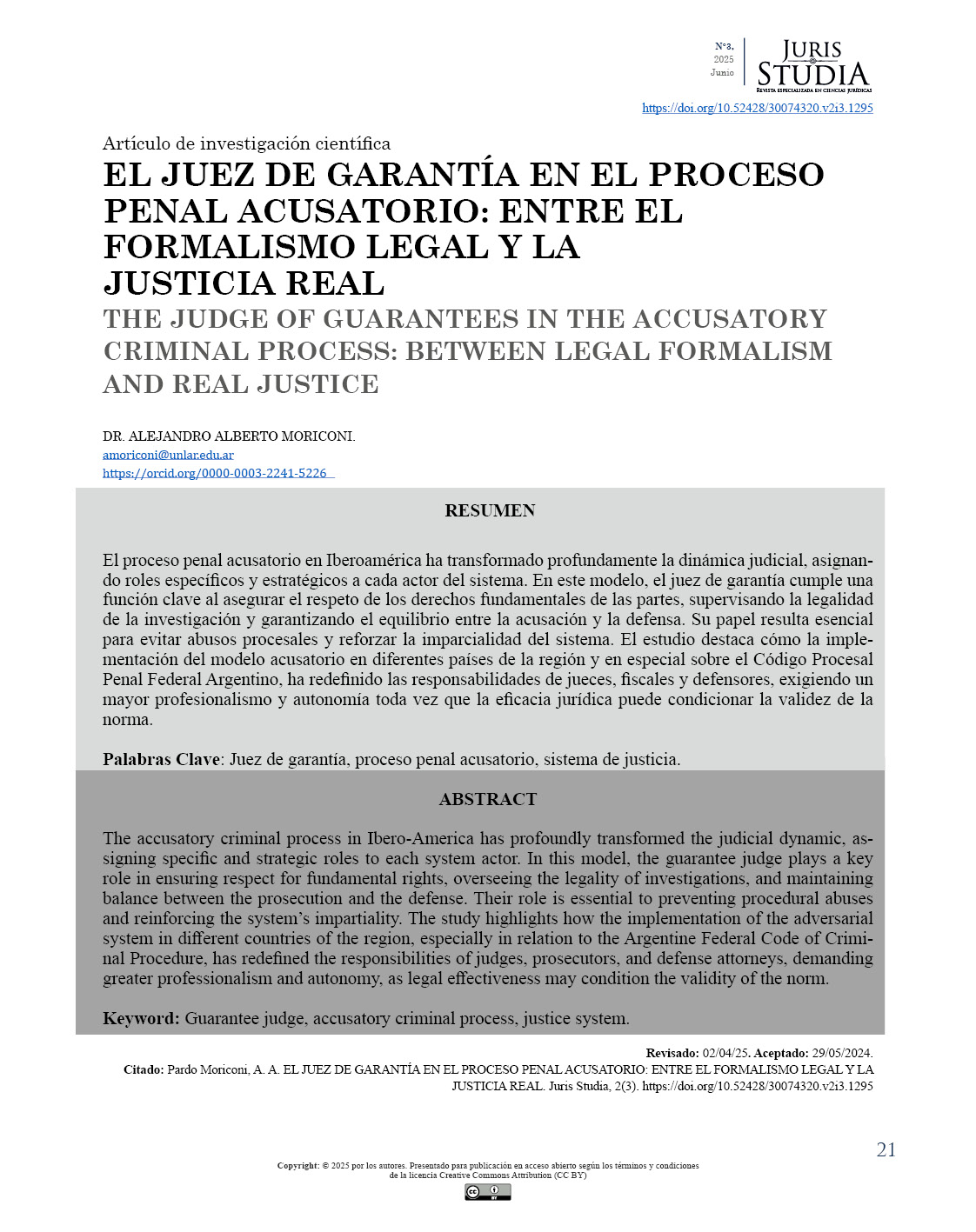THE GUARANTEE JUDGE IN THE ACCUSATORY CRIMINAL PROCESS: BETWEEN LEGAL FORMALISM AND REAL JUSTICE
DOI:
https://doi.org/10.52428/30074320.v2i3.1295Keywords:
Guarantee judge, accusatory criminal process, justice system.Abstract
The accusatory criminal process in Ibero-America has profoundly transformed the judicial dynamic, assigning specific and strategic roles to each system actor. In this model, the guarantee judge plays a key role in ensuring respect for fundamental rights, overseeing the legality of investigations, and maintaining balance between the prosecution and the defense. Their role is essential to preventing procedural abuses and reinforcing the system’s impartiality. The study highlights how the implementation of the adversarial system in different countries of the region, especially in relation to the Argentine Federal Code of Criminal Procedure, has redefined the responsibilities of judges, prosecutors, and defense attorneys, demanding greater professionalism and autonomy, as legal effectiveness may condition the validity of the norm.
References
Binder, A. (2002). Introducción al proceso penal acusatorio. Ad-Hoc.
Blanco Suarez, R (2024). El rol del juez de garantía en el debate de medidas cautelares personales. Revisión
https://doi.org/10.22235/rd30.3961 normativa de los sistemas procesales penales de Chile, Uruguay y Argentina. Revista de Derecho, (30), e3961.
Dworkin, R (1999). Los Derechos en Serio. Ariel.
Duce, M; Riego C. (2007). Proceso penal. Editorial Jurídica.
Europol. (2020). Darknet and Crypto Crime Report. Europol Publications.
Ferrajoli, L. (2018). Un caso clínico di patologia giudiziaria. Edhasa.
Ferrajoli, L y Bobbio, N (1995). Derecho y razón: teoría del garantismo penal. Trotta.
García Ghirelli, J (2001). Tratados y Documentos Internacionales. Zavalia
Garvie, C., Bedoya, A., & Frankle, J. (2016). The Perpetual Line-Up: Unregulated Police Face Recognition in America. Georgetown Law Center on Privacy & Technology.
Hart, H (2007). El Concepto de Derecho. Abeledo Perrot.
Kelsen, H. (2017). Teoría Pura del Derecho. Eudeba.
Maier, J. (1996). Derecho procesal penal: Fundamentos. Editores del Puerto.
Zaffaroni, E. (2011). La cuestión criminal. Ediciones Madres de Plaza de Mayo. Legislación y Jurisprudencia Internacional.
Argentina (1994). Constitución de la Nación Argentina. Ley Nº 24.430. Ordénese la publicación del texto oficial de la Constitución Nacional, sancionada en 1853 con las reformas de los años 1860, 1866, 1898, 1957 y 1994). SAIJ.
Argentina (2019). Código Procesal Penal Federal. SAIJ, Ley No 27.482, publicado en Boletín Oficial del 08 de febrero de 2019. Numero 34052 y Decreto del Poder Ejecutivo Nacional 188/2024 por el cual establece su implementación progresiva en todo el territorio de la República Argentina. SAIJ. Página 29 de 29
Argentina (2007). Corte Suprema de Justicia de la Nación Argentina. Díaz Bessone. Fallos: 330:4027. SAIJ.
Argentina (2018). Corte Suprema de Justicia de la Nación Argentina. Fallos: Provocación del delito y debido proceso. SAIJ.
Bolivia. (1999). Código de Procedimiento Penal (Ley Nº 1970). Gaceta Oficial de Bolivia.
Bolivia (2012). Tribunal Constitucional. Sentencia Constitucional Plurinacional 0596/2012. https://jurisprudencia.tcpbolivia.bo/Fichas/ObtieneResolucion
Bolivia (2013). Tribunal Constitucional. Sentencia Constitucional Plurinacional 1949/2013. https://jurisprudencia.tcpbolivia.bo/Fichas/ObtieneResolucion
Bolivia (2014). Tribunal Supremo de Justicia Bolivia. Auto Supremo AS/0394/2014-RRC. Juristeca.com/bo/tsj.
Bolivia (2015). Tribunal Supremo de Justicia Bolivia. Auto Supremo AS/0704/2015-RRC-L. Juristeca.com/bo/tsj
Colombia (2005). Corte Constitucional. Sentencia C-799/05. www.corteconstitucional.gov.co
Colombia (2007) Corte Constitucional. Sentencia C-396/07. www.corteconstitucional.gov.co
Chile (2000). Código Procesal Penal de Chile, Ley N° 19.696 y su modificatoria. Biblioteca del Congreso Nacional de Chile.
Convención Americana sobre Derechos Humanos (1969). Adoptada en San José, Costa Rica, el 22 de noviembre de 1969. Entro en vigor el 18 de julio de 1978, conforme al Artículo 74.2 de la citada convención y aprobada por la República Argentina mediante Ley N° 23054. SAIJ.
México (2019). Suprema Corte de Justicia de la Nación de México. Amparo en Revisión 504/2019

Downloads
Published
How to Cite
Issue
Section
License
Copyright (c) 2025 Alejandro Alberto Moriconi

This work is licensed under a Creative Commons Attribution 4.0 International License.
Authors who publish with this journal agree to the following terms:
- Authors retain copyright and grant the journal right of first publication with the work simultaneously licensed under a Creative Commons Attribution License 4.0 that allows others to share the work with an acknowledgement of the work's authorship and initial publication in this journal.
- Authors are able to enter into separate, additional contractual arrangements for the non-exclusive distribution of the journal's published version of the work (e.g., post it to an institutional repository or publish it in a book), with an acknowledgement of its initial publication in this journal.
- Authors are permitted and encouraged to post their work online (e.g., in institutional repositories or on their website) prior to and during the submission process, as it can lead to productive exchanges, as well as earlier and greater citation of published work.










